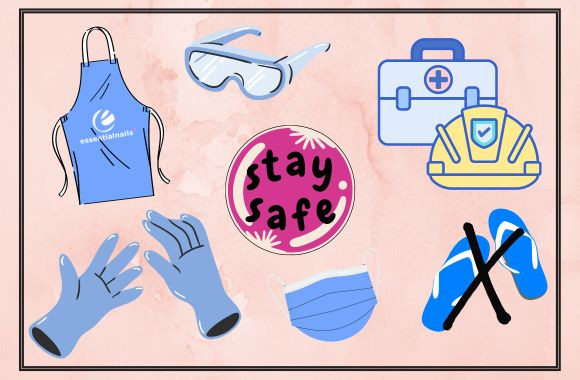Ensuring Safety and Protection: The Importance of PPE in Nail Salons in the UK
Ensuring Safety and Protection: The Importance of PPE in Nail Salons in the UK
In the United Kingdom's thriving beauty industry, nail salons are popular destinations for individuals seeking professional nail care and relaxation. However, amidst the pursuit of beauty and pampering, it is crucial to prioritize safety and well-being. Personal Protective Equipment (PPE) is specialist equipment or clothing to protect against safety hazards and plays a significant role in creating a secure environment within UK nail salons. This article explores the importance of PPE and the various types utilized, highlighting their key benefits for both customers and salon professionals.
The Importance of PPE:
Personal Protective Equipment serves as a critical defense against potential hazards, ensuring the safety of both customers and salon professionals. In the UK nail salon setting, where exposure to chemicals, pathogens, and physical risks is common, PPE acts as a shield, preventing accidents and health-related issues. By implementing appropriate PPE measures, salon owners and technicians demonstrate their commitment to maintaining a safe and hygienic environment, in line with UK health and safety regulations.
Types of PPE in UK Nail Salons:
-
Gloves:
Disposable gloves, typically made of nitrile or latex, protect nail technicians from direct contact with chemicals and minimize the risk of infection. Gloves are essential during procedures involving acetone, polishes, and artificial nail products. Salon professionals in the UK should ensure they use gloves that meet the appropriate regulatory standards.
-
Masks:
Masks, such as surgical masks or respirators, act as a barrier against airborne particles, dust, and fumes. Nail technicians wear masks to protect their respiratory system from potential chemical irritants, such as acrylic dust, and to prevent the spread of germs and bacteria. The use of masks in UK nail salons should adhere to the guidelines provided by the Health and Safety Executive (HSE).
-
Eye Protection:
Safety glasses or goggles shield the eyes from accidental splashes of chemicals, acrylic filings, or other debris. They are particularly critical during nail filing and drilling procedures where particles can easily enter the eyes. Eye protection in UK nail salons should meet the British Standards Institution (BSI) requirements.
-
Aprons and Smocks:
These protective garments shield the clothing of nail technicians from chemicals and other substances that may stain or damage fabrics. Aprons and smocks should be made from waterproof or resistant materials, adhering to UK regulations for salon hygiene and cleanliness.
-
Footwear and Shoe Covers:
Nail salon professionals should wear closed-toe shoes or dedicated footwear that provides protection against dropped objects and spills. Additionally, the use of disposable shoe covers can prevent contamination of the salon floor and maintain cleanliness. The footwear used in UK nail salons should meet relevant safety standards set by the HSE.
Benefits of Implementing PPE in UK Nail Salons:
- Compliance with Regulations: Adhering to PPE guidelines ensures that nail salons in the UK comply with health and safety regulations, including those set by the Health and Safety Executive. Salon owners should stay updated with any changes or requirements to maintain a legal and responsible operation.
- Enhanced Hygiene: PPE serves as a fundamental component of maintaining proper hygiene standards in UK nail salons. It helps minimize the risk of cross-contamination between clients and reduces the spread of germs and bacteria, aligning with the requirements set by the UK's National Health Service (NHS).
- Occupational Safety: Providing nail technicians with appropriate Personal Protective Equipment demonstrates salon owners' commitment to the safety and well-being of their employees. This fosters a positive work environment, reduces the likelihood of occupational hazards or injuries, and supports employee welfare initiatives.
- Client Confidence: When clients witness the meticulous use of PPE in a UK nail salon, they gain confidence in the establishment's commitment to their safety.
It is essential all employees of a salon know the principles of Health & Safety, understand how to maintain health, safety, and hygiene. Know and understand the salon’s emergency/evacuation procedures.
For further information on Salon regulations and requirements, see:
- The Health and Safety Act 1974
- The Management of Health and Safety at Work Regulations. 1999
- Reporting of Injuries, Diseases and Dangerous Occurrences Regulations 1995 (RIDDOR)
- Control of Substances Hazardous to Health Regulations 2002 (COSHH)
- Personal Protective Equipment 2002
- Manual Handling Operations Regulations (1992)
- Health and Safety (First Aid) Regulations (1981)
- Electricity at Work Regulations
- The Regulatory Reform (Fire Safety) Order 2005
- Employers’ Liability (Compulsory Insurance) Act 1969
- The Data Protection Act (1988 and 2003)

